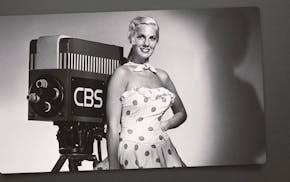"Your mum and dad, they muck you up/They don't mean to, but they do," Philip Larkin wrote in "This Be the Verse." (He used a stronger word than "muck.") Between its hard truths and singsong comic tone, it's probably the most memorable poem ever about Bad Parenting. It also echoes the style and sensibility of Elizabeth McKenzie's madcap second novel, "The Portable Veblen."
Oddball characters and plot turns abound, including talking squirrels and bureaucratic ironies worthy of "Catch-22." But a sober question occupies its core: Do our parents' best intentions do us harm?
At the novel's heart is a bright but very baggage-laden couple. Veblen is the daughter of an institutionalized Vietnam vet and a hypochondriac mother who demands close ethical consideration of every act. (So much so she has named her poor kid after sociologist Thorstein Veblen, best known for coining the term "conspicuous consumption.") Paul is a neurologist with a specialty in brain injuries who's trying to escape his hippie parents.
Veblen first meets Paul while he's carefully examining some creature near a table saw, and her interruption leads to his "spraying a curtain of red mist onto his lab coat and the wall." Despite being the worst meet-cute ever, it's love.
"The Portable Veblen" is effectively a romance — the main plot turns on their upcoming wedding in northern California. Naturally, there are roadblocks. A device Paul invents for combat medics to treat brain injuries is manhandled by the military-industrial complex, and an anxious Veblen is projecting a lot of her premarital nerves onto a squirrel she's rescued. ("It seemed the squirrel sensed the gravity of the matter," McKenzie deadpans.)
But the biggest problems are the moms and dads on both sides, who are too easygoing on Paul's side and furiously demanding on Veblen's. ("Have you eaten well today?" mom asks. "Are you taking your iron tablets? Will you ignore me when I come?")
Which is to say the novel is consistently concerned with people with messed-up heads. But McKenzie successfully plays up the humor: Veblen's squirrel talk isn't a serious issue but a quirk that with a little focus she might get past.
If there are a few too many scenes of parents and kids rolling their eyes at each other, the extra bulk serves the point that escaping past your past isn't easy.
"All he wanted was less waste, less junk, less vested interests, less counterfeit life," Veblen muses about her namesake. "Was that so hard to understand, people?" For many of us, very.
Mark Athitakis is a reviewer in Phoenix.

Twin Cities native Dolores Rosedale, glamorous '50s TV model and actress, dies at 95


